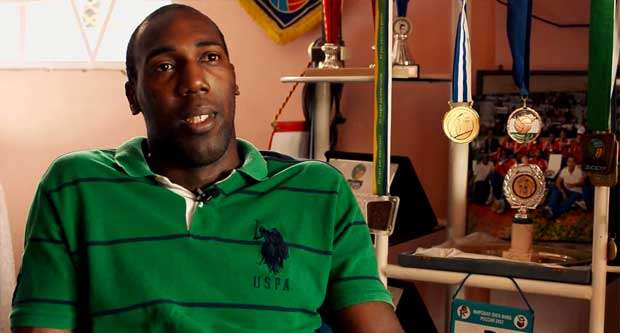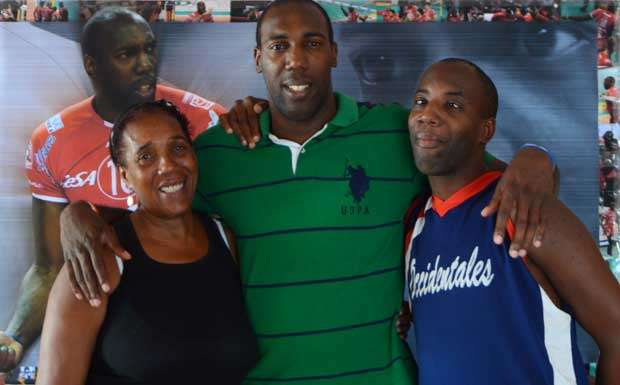Simon Aties Roberlandy can talk without opening his mouth, not moving a lip. His face will tell you all, he has Cuba embodied in his forehead. He still shows in his face the unbearable fatigue of having left behind the island.
At 26 and with an ocean in between, Simon still has not been able escape the authority of his mother. One notices that, without Nancy Aties, Roberlandy had not been Simon. His mother is one of the many reasons why he decided to take flight to a strange city hundreds of miles from the peripheral Havana neighborhood of Alturas de la Víbora.
When we got home, he was napping; slow and sleepy he sat in front of me, impressive with 2.06 meters of height. Near a corner brimming with shiny trophies and medals, lying in the light of its success, we started talking.
Your parents were great basketball players. Why volleyball instead of basketball for you?
Basketball is a sport that has no match, is one of my favorite sports. But volleyball was the one that opened the doors for me, let me in to the Sports School and at the time I tried to go as basketball player there were no spaces available. Volleyball teachers talked to me and convinced me. All I wanted was to play a sport, and ultimately I had practiced basketball, soccer, baseball and even judo.
In Cuba volleyball has its peculiarities; say generally it does not have a well defined structure. How do you make the national team?
I entered when I was still in the category of cadets, at the beginning I had surgery on one knee and trained very little with the team. After the operation I joined an internal tournament, out of which they chose boys to be part of the various national team. Hence is that I selected for the Cuba team along with Rolando Jurquin, Oriol Camejo, Michael Sanchez and others.
From one moment to another Roberlandy Simon passed from being a promising player with a long-term future to one of the stars of the national team, was it something that you expected?
My first international experience was at 17. I remember we went to a friendly cap in Russia and then to Argentina in preparation for the World League. It was not the regular; I used only to watch from the bench, the regulars were Pavel Pimienta and Dominico.
I was very young and coach included me into the squad to get some experience. The only good thing was that I trained with the regulars and that gave me the opportunity to improve. Pimineta was a great example, he helped me a lot. After those initial years I was old enough to be a starter. The first time I played as a starter was in the 2006 World Cup.
When you became a regular starter you were given a new challenge: Captain. How did you assume that responsibility?
Being the captain of Cuba was not something that I was interested in, I really didn’t like it, I wanted to be just me and play volleyball without any responsibility. I did not want to have any position within the team. We were mostly young boys who didn’t care about anything and the only thing we enjoyed was playing volleyball, but in terms of discipline we were not very good. We were summoned for everything, that’s life when you’re young, sometimes you do not think.
It was a difficult time in my career; I did not want to take that position, even with my mother I went to the National School Volleyball to take away that responsibility from my shoulders. Then I realized that it meant nothing and I was adjusting to the captaincy. Really I do not know how I did it, now l look back and was very nice.
What factors influenced the defragmentation of that great group of players that made that team 3 or 4 years ago?
The same affecting them now, what happens to boys who are in the team today. Always players leave the team and against that nothing can be done. In my day we suffered the departure always of a player, then that is going to leave a hole and the new one has to take the necessary experience for the position and when he reaches it, another leaves. That’s why the Cuban team has so much trouble to stay in the world elite, in the supremacy as we say.
Two years ago you made the decision to part with the national team to start a career as a professional volleyball player in Italy. What were the main reasons?
It was a personal decision. One day I got out of bed and told my mom I could not take it anymore. We had many internal problems that remain and continue generation after generation because kids now tell me that is the same. We know that the country has no optimum training conditions but those conditions must improve. They are difficult to remember, so I have not talked about it.
Now in Cuba we can perceive, in a way, the beginning of a shift in the administration of the sports by the authorities. What do you think of these movements?
That is very good. These same guys in the national team are going on the right track but lack much competitive experience. The world of volleyball has grown a lot professionally and what you see in a professional league you do not see it in a World League. You have to wait for a World Cup or the Olympics to see the true level as seen in the professional leagues in Russia, Italy and Brazil.
What is being handled would be excellent for Cubans because if it happens, they can play at the highest level and raise ours. They would get a lot of experience and collide with the current dynamics of the volleyball, would be a very helpful development.
You had intended to wait until London 2012?
I had thought my career in Cuba, I just got up that day and told my mom I could not stand it. London 2012 only no, Brazil 2016 and all that followed after, that was not a problem for me, the real problem is that the things that wear you out and there comes a time you cannot help it and there is no other thing to do but to leave.
Once in Piacenza in Italy how did you adapt to this new challenge?
Very difficult, you have your family far away and customs are not forgotten. In Cuba on a holiday you see all the people who you least imagine and even people who you do not know. There holidays are normal days.
What differences have you noticed between the professional and the Cuban volleyball?
In the professional volleyball you prepare almost always for the weekend and according to the opponent. The physical preparation works to last all year, not like in Cuba where one relaxes a bit because you train only for the World League. In the professionalism you do physical training twice a week and you do not run, quite the opposite here. It is given because what is left from running is used for the tactical and technical parts, is training with ball a little less but with more intensity.
Cuban Volleyball prepares for once-a-year competition; there you prepared to get points every weekend.
Do you feel any remorse for leaving Cuba and the selection?
I feel calm, maybe it was a decision I did not take at the right time but I am serene. There are people who see me in a different way, many people ask me why I left the team and I tell them that this is not a question that should make to me.
What feelings aroused your return to the Sports City Coliseum?
It is the fact to recall something very dear, although not alike because it is a Coliseum which is much emptier, but people still enjoy. It’s very pretty, sitting there makes you relive moments, despite you are not playing, you feel the same warmth of those who are playing. I’m so sad, because you’re a Cuban too and know how it feels when you are there. It’s something that you don’t trade for anything.
Are you willing to return to the national team?
I have been offered to play for other countries, Bulgaria, Italy and I said no, I’m Cuban. I do not mind the size of the offer, I am Cuban, period. If they ever leave me I’ll play for Cuba, if not, I will not play for any other country. I told Pavel Pimienta I had no trouble playing back to Cuba.
Osmani Juantorena once said he wanted to play with Cuba but the request was denied. It is a very difficult subject. Personally, I would be very happy because it would be a step forward.
Cuba?
This is my country, I was born here, I’m still 100% Cuban, wherever I go everybody knows it; in Italy I don’t stop talking about Cuba. It is a life very different from anywhere in the world, totally different. Back home the bell does not ring, here the doorbell never stops. Here the neighbor asks for a little salt or a bucket of water, no one bothers you there, if you want salt and water you have to go down to buy it, those are things that define Cuba as a unique country in the world.











